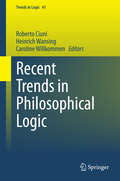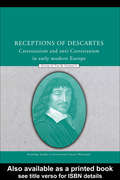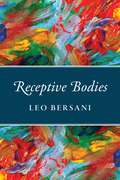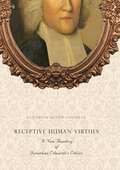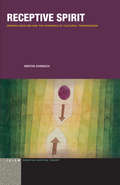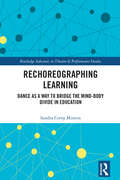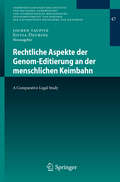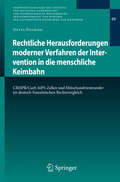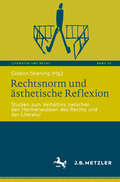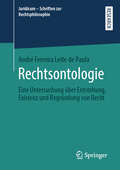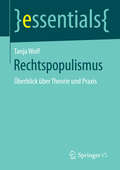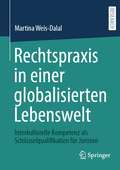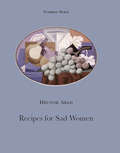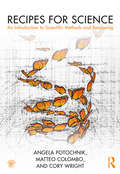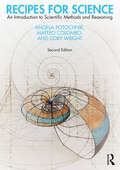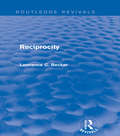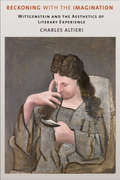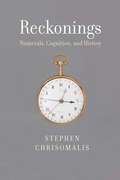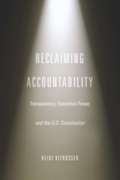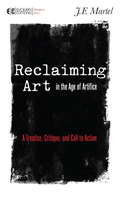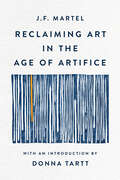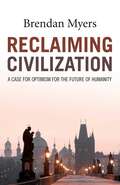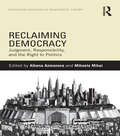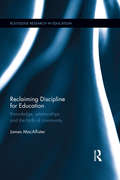- Table View
- List View
Recent Trends in Philosophical Logic
by Roberto Ciuni Heinrich Wansing Caroline WillkommenThis volume presents recent advances in philosophical logic with chapters focusing on non-classical logics, including paraconsistent logics, substructural logics, modal logics of agency and other modal logics. The authors cover themes such as the knowability paradox, tableaux and sequent calculi, natural deduction, definite descriptions, identity, truth, dialetheism and possible worlds semantics. The developments presented here focus on challenging problems in the specification of fundamental philosophical notions, as well as presenting new techniques and tools, thereby contributing to the development of the field. Each chapter contains a bibliography, to assist the reader in making connections in the specific areas covered. Thus this work provides both a starting point for further investigations into philosophical logic and an update on advances, techniques and applications in a dynamic field. The chapters originate from papers presented during the Trends in Logic XI conference at the Ruhr University Bochum, June 2012.
Receptions of Descartes: Cartesianism and Anti-Cartesianism in Early Modern Europe (Routledge Studies in Seventeenth-Century Philosophy #Vol. 8)
by Tad M. SchmaltzReceptions of Descartes is a collection of work by an international group of authors that focuses on the various ways in which Descartes was interpreted, defended and criticized in early modern Europe. The book is divided into five sections, the first four of which focus on Descartes' reception in specific French, Dutch, Italian and English contexts and the last of which concerns the reception of Descartes among female philosophers.
Receptive Bodies
by Leo BersaniLeo Bersani, known for his provocative interrogations of psychoanalysis, sexuality, and the human body, centers his latest book on a surprisingly simple image: a newborn baby simultaneously crying out and drawing its first breath. These twin ideas—absorption and expulsion, the intake of physical and emotional nourishment and the exhalation of breath—form the backbone of Receptive Bodies, a thoughtful new essay collection. These titular bodies range from fetuses in utero to fully eroticized adults, all the way to celestial giants floating in space. Bersani illustrates his exploration of the body’s capacities to receive and resist what is ostensibly alien using a typically eclectic set of sources, from literary icons like Marquis de Sade to cinematic provocateurs such as Bruno Dumont and Lars von Trier. This sharp and wide-ranging book will excite scholars of Freud, Foucault, and film studies, or anyone who has ever stopped to ponder the give and take of human corporeality.
Receptive Human Virtues: A New Reading of Jonathan Edwards's Ethics
by Elizabeth Agnew CochranThis book offers a new reading of Jonathan Edwards’s virtue ethic that examines a range of qualities Edwards identifies as “virtues” and considers their importance for contemporary ethics. Each of Edwards’s human virtues is “receptive” in nature: humans acquire the virtues through receiving divine grace, and therefore depend utterly on Edwards’s God for virtue’s acquisition. By contending that humans remain authentic moral agents even as they are unable to attain virtue apart from his God’s assistance, Edwards challenges contemporary conceptions of moral responsibility, which tend to emphasize human autonomy as a central part of accountability.
Receptive Spirit: German Idealism and the Dynamics of Cultural Transmission (Idiom: Inventing Writing Theory)
by Márton DornbachPremised on the assumption that the mind is fundamentally active and self-determining, the German Idealist project gave rise to new ways of thinking about our dependence upon culturally transmitted models of thought, feeling, and creativity. Receptive Spirit elucidates the ways in which Kant, Fichte, Schlegel, and Hegel envisioned and enacted the conjunction of receptivity and spontaneous activity in the transmission of human-made models of mindedness. Their innovations have defined the very terms in which we think about the historical character of aesthetic experience, the development of philosophical thinking, the dynamics of textual communication, and the task of literary criticism.Combining a reconstructive approach to this key juncture of modern thought with close attention paid to subsequent developments, Marton Dornbach argues that we must continue to think within the framework established by the Idealists if we are to keep our bearings in the contemporary intellectual landscape.
Rechoreographing Learning: Dance As a Way to Bridge the Mind-Body Divide in Education (Routledge Advances in Theatre & Performance Studies)
by Sandra Cerny MintonThis book addresses the mind-body dichotomy in movement and dance. This book includes a description of the often-forgotten kinesthetic sense, body awareness, somatic practices, body-based way of thinking, mental imagery, nonverbal communication, human empathy, and symbol systems, what occurs in the brain during learning, and why and how movement and dance should be part of school curricula. This exploration arguers that becoming more aware of bodily sensations serves as a basis for knowing, communicating, learning, and teaching through movement and dance. This book will be of great interest to scholars and students interested in teaching methodology and for courses in physical education, dance, and education.
Rechtliche Aspekte der Genom-Editierung an der menschlichen Keimbahn: A Comparative Legal Study (Veröffentlichungen des Instituts für Deutsches, Europäisches und Internationales Medizinrecht, Gesundheitsrecht und Bioethik der Universitäten Heidelberg und Mannheim #47)
by Jochen Taupitz Silvia DeuringDas Buch enthält 19 Landesberichte und eine rechtsvergleichende Analyse der rechtlichen Regelungen zum Verfahren der Genom-Editierung an der menschlichen Keimbahn. Es wird herausgearbeitet, welche gemeinsamen Werte die verschiedenen Rechtsordnungen verbinden und welche Unterschiede bestehen. Auf dieser Grundlage wird untersucht, ob eine internationale Regulierung der Thematik möglich ist und wie diese ausgestaltet sein könnte. Zudem soll untersucht werden, in wie weit die Regelungen anderer Länder als Modell für die deutsche Gesetzgebung dienen können.
Rechtliche Herausforderungen moderner Verfahren der Intervention in die menschliche Keimbahn: CRISPR/Cas9, hiPS-Zellen und Mitochondrientransfer im deutsch-französischen Rechtsvergleich (Veröffentlichungen des Instituts für Deutsches, Europäisches und Internationales Medizinrecht, Gesundheitsrecht und Bioethik der Universitäten Heidelberg und Mannheim #49)
by Silvia DeuringDieses Buch befasst sich mit der rechtlichen Bewertung von modernen Verfahren der Intervention in die menschliche Keimbahn, d.h. von gentechnischen Veränderungen am Menschen, die an die nachfolgenden Generationen weitergegeben werden. Neuartige Methoden wie die CRISPR/Cas9-Technik, der Mitochondrientransfer und die Möglichkeit der Herstellung artifizieller Gameten aus hiPS-Zellen stellen das Recht vor neue Herausforderungen. Insbesondere ist fraglich, ob die aktuell bestehenden Gesetze diese neuen Verfahren noch erfassen oder ob gesetzliche Lücken entstanden sind. Dieses Buch analysiert in diesem Zusammenhang die Rechtslage in Deutschland und Frankreich. Es behandelt dabei sowohl genetische Veränderungen an menschlichen Keimbahnzellen zur Forschung in vitro als auch solche, die in der Geburt von Menschen münden. Zudem wird der Frage nachgegangen, ob das deutsche Verfassungsrecht einer Anwendung dieser Verfahren grundsätzlich entgegensteht oder ob eine gesetzliche Zulassung in der Zukunft unter bestimmten Voraussetzungen möglich wäre. Auf der Grundlage des Rechtsvergleichs sowie der verfassungsrechtlichen Untersuchung formuliert das Buch einen Regelungsvorschlag, sowohl zur Beseitigung aktuell bestehender rechtlicher Lücken und Unklarheiten als auch im Hinblick auf eine (künftige) mögliche Anwendung der Verfahren.
Rechtsnorm und ästhetische Reflexion: Studien zum Verhältnis zwischen den Hermeneutiken des Rechts und der Literatur (Literatur und Recht #13)
by Gideon StieningDer Band versammelt Studien zur juristischen und zur literarischen Hermeneutik sowie zu deren Verhältnis. Auf der Grundlage philosophischer und theologischer Konzepte zum Verstehen und zur Interpretation von Texten werden die Besonderheiten der Auslegung von Recht und Literatur erörtert. Die spezielle Herausforderung besteht in der Korrelation der spezifisch juristischen und spezifisch literarischen Kunst der Auslegung. Berücksichtigt werden zudem der historische Wandel dieser Bereichshermeneutiken und deren Verhältnis zueinander.
Rechtsontologie: Eine Untersuchung über Entstehung, Existenz und Begründung von Recht (Juridicum - Schriften zur Rechtsphilosophie)
by André Ferreira Leite de PaulaDas Buch bietet eine Analyse der Ontologie des Rechts in Auseinandersetzung mit den wichtigsten realistischen, konstruktivistischen und phänomenologischen Konzeptionen. Die Darstellung verläuft problemorientiert, anstatt auf einzelne Autoren oder Theorien zentriert zu sein. Anhand einer Analyse der Verhältnisse von Normativität und Bewusstsein zeigt der Autor, wie sowohl das nichtpositive Recht als auch ungerechte Rechtsnormen eine Ontologie haben können und dass jeglicher Anspruch auf überpositives Recht in letzter Instanz naturrechtlich ist. Es wird auch ontologisch dargelegt, wie das richterliche Entscheiden einen berechtigten Anspruch auf Wahrheit erheben kann.
Rechtspopulismus: Überblick über Theorie und Praxis (essentials)
by Tanja WolfZiel dieses essential ist, das Ph#65533;nomen des Rechtspopulismus mittels konkreter Begriffsdefinition, zentraler Merkmale und ausgew#65533;hlter Fallbeispiele pr#65533;zise und leicht verst#65533;ndlich zu erkl#65533;ren. Die Diskussion um die Findung einer einheitlichen Definition sowie die fr#65533;hesten populistischen Bewegungen, wie etwa die People's Party, werden beschrieben um das Verst#65533;ndnis f#65533;r das Konzept des (Rechts-)populismus und seine Grenzen zu sch#65533;rfen. Verschiedene typische Charakteristika wie das spezielle Verh#65533;ltnis zu den Medien oder der charismatische Anf#65533;hrer sollen den Blick f#65533;r populistische Ph#65533;nomene in der heutigen Zeit kl#65533;ren und die Analyse der beiden Fallbeispiele PVV und AfD, sowie ihre spezifischen Eigenheiten leichter nachvollziehbar machen.
Rechtspraxis in einer globalisierten Lebenswelt: Interkulturelle Kompetenz als Schlüsselqualifikation für Juristen
by Martina Weis-DalalInterkulturalität ist in sämtlichen Bereichen des alltäglichen Lebens zu einem Merkmal unserer Zeit geworden. Mit den sich hieraus ergebenden Herausforderungen sieht sich auch die deutsche Justiz zunehmend konfrontiert. Am Beispiel des Strafrechts gibt dieser Band Aufschluss darüber, in welchen Hinsichten Kultur in der Rechtspraxis von Bedeutung ist, welche Fähigkeiten interkulturelle Kompetenz in Rechtsprechung und Rechtsberatung ausmachen und stellt Konzepte vor, wie eine zukunftsweisende Juristenausbildung aussehen könnte, die der Vielfalt unserer globalisierten Lebenswelt Rechnung trägt.Die AutorinDie Kulturwissenschaftlerin und Pädagogin Martina Weis-Dalal war in den Jahren 2014 - 2020 als wissenschaftliche Mitarbeiterin an der Juristischen Fakultät der Universität Würzburg tätig, wo sie das interdisziplinäre Lehrprojekt „Globale Systeme und interkulturelle Kompetenz“ (GSiK) vertrat und zu Interkulturalität und Recht lehrte.
Rechtsterrorismus in der alten Bundesrepublik: Historische und sozialwissenschaftliche Perspektiven (Edition Rechtsextremismus)
by Fabian Virchow Hendrik PulsDie politische und wissenschaftliche Aufmerksamkeit für rechtsterroristische Gewalt hat nach Bekanntwerden der Morde des NSU (Nationalsozialistischer Untergrund) zugenommen. Zugleich ist die lange Geschichte des Rechtsterrorismus in Deutschland im Detail und unter Auswertung zeitgenössischer Archivalien und Dokumente noch weitgehend unerforscht. Der Band versammelt entsprechend aktuelle Forschungsergebnisse zu rechtsterroristischer Gewalt in den 1980er Jahren, einer Hochphase dieser Gewaltpraxis.
Recipes for Sad Women
by Anne Mclean Hector AbadNo one knows the recipe for happiness - and yet Héctor Abad has given us a whole volume. His recipes, at times bizarre, at times wise, can cure almost anything - although the ingredients are not always easy to come by. "Cauliflower in the mist" is protection against melancholy, seasoned with salty tears; and the right preparation of lobster and cutlet can have extraordinary effects on the human mind. With subtle wit and irony, Abad gives practical advice on how to eschew sadness, attract joy and retain delight.
Recipes for Science: An Introduction to Scientific Methods and Reasoning
by Angela Potochnik Matteo Colombo Cory WrightToday, scientific literacy is an essential aspect of any undergraduate education. Recipes for Science responds to this need by providing an accessible introduction to the nature of science and scientific methods, reasoning, and concepts that is appropriate for any beginning college student. It is designed to be adaptable to a wide variety of different kinds of courses, such as introductions to scientific reasoning or critical thinking, philosophy of science, and science education. In any of these different uses, the book helps students better navigate our scientific, 21st-century world. Key Features Contemporary and historical examples of science from many fields of physical, life, and social sciences. Visual aids to clarify and illustrate ideas. Text boxes to explore related topics. Plenty of exercises to ensure full student engagement and mastery of the information. Annotated 'Further Reading' sections at the end of each chapter. Final glossary with helpful definitions of key terms. A companion website with author-developed and crowdsourced materials, including syllabi for courses using this textbook, bibliography of additional resources and online materials, sharable PowerPoint presentations and lecture notes, and additional exercises and extended projects.
Recipes for Science: An Introduction to Scientific Methods and Reasoning
by Angela Potochnik Matteo Colombo Cory WrightScientific literacy is an essential aspect of any undergraduate education. Recipes for Science responds to this need by providing an accessible introduction to the nature of science and scientific methods appropriate for any beginning college student. The book is adaptable to a wide variety of different courses, such as introductions to scientific reasoning, methods courses in scientific disciplines, science education, and philosophy of science.Special features of Recipes for Science include contemporary and historical case studies from many fields of physical, life, and social sciences; visual aids to clarify and illustrate ideas; text boxes to explore related topics; plenty of exercises to support student recall and application of concepts; suggestions for further readings at the end of each chapter; a glossary with helpful definitions of key terms; and a companion website with course syllabi, internet resources, PowerPoint presentations, lecture notes, additional exercises, and original short videos on key topics.Key Updates to the Second Edition 13 short chapters of uniform length that make it easier to adapt to a college semester Case studies and examples featuring new research and important historical research across many fields of science Added discussion of timely topics, including large research collaborations, trust and distrust of science, machine learning and other technology-driven advances, diversity in science, and connections to indigenous knowledge Streamlined and simplified discussion of some topics, such as experimentation and statistical hypothesis-testing Exercises that are clearly aligned with learning goals and sorted into types: Recall, Apply, and Think Additional online exercises and a series of original videos on key topics Exercise solutions available on an instructor-only section of the website
Reciprocity (Routledge Revivals)
by Lawrence C. BeckerThe tendency to reciprocate – to return good for good and evil for evil – is a potent force in human life, and the concept of reciprocity is closely connected to fundamental notions of ‘justice’, ‘obligation’ or ‘duty’, ‘gratitude’ and ‘equality’. In Reciprocity, first published in 1986, Lawrence Becker presents a sustained argument about reciprocity, beginning with the strategy for developing a moral theory of the virtues. He considers the concept of reciprocity in detail, contending that it is a basic virtue that provides the basis for parental authority, obligations to future generations, and obedience to law. Throughout the first two parts of the book, Becker intersperses short pieces of his own narrative fiction to enrich reflection on the philosophical arguments. The final part is devoted to extensive bibliographical essays, ranging over anthropology, psychology, political theory and law, as well as the relevant ethics and political philosophy.
Reckoning with the Imagination: Wittgenstein and the Aesthetics of Literary Experience
by Charles AltieriMuch current theorizing about literature involves efforts to renew our sense of aesthetic values in reading. Such is the case with new formalism as well as recent appeals to the notion of "surface reading." While sympathetic to these efforts, Charles Altieri believes they ultimately fall short because too often they fail to account for the values that engage literary texts in the social world. In Reckoning with the Imagination, Altieri argues for a reconsideration of the Kantian tradition of Idealist ethics, which he believes can restore much of the power of the arguments for the role of aesthetics in art. Altieri finds a perspective for that restoration in a reading of Wittgenstein's later work that stresses Wittgenstein's parallel criticisms of the spirit of empiricism. Altieri begins by offering a phenomenology of imagination, because we cannot fully honor art if we do not link it to a distinctive, socially productive force. That force emerges in two quite different but equally powerful realizations in his reading of John Ashbery's "Instruction Manual," which explicitly establishes a model for a postromantic view of imagination, and William Butler Yeats's "Leda and the Swan." He then turns to Wittgenstein with chapters on the role of display as critique of Enlightenment thinking, the honoring of qualities like sensitivity and the ability to attune to the actions of others, the role of expression in the building of models, and the contrast between ethical and confessional modes of judgment. Finally, Altieri produces his own model of aesthetic experience as participatory valuation and makes an extended argument for the social significance of appreciation as a way to escape the patterns of resentment fundamental to our current mode of politics. A masterful work by one of our foremost literary and philosophical theorists, Reckoning with the Imagination will breathe new life into ongoing debates over the value of aesthetic experience.
Reckonings: Numerals, Cognition, and History
by Stephen ChrisomalisInsights from the history of numerical notation suggest that how humans write numbers is an active choice involving cognitive and social factors.Over the past 5,000 years, more than 100 methods of numerical notation--distinct ways of writing numbers--have been developed and used by specific communities. Most of these are barely known today; where they are known, they are often derided as cognitively cumbersome and outdated. In Reckonings, Stephen Chrisomalis considers how humans past and present use numerals, reinterpreting historical and archaeological representations of numerical notation and exploring the implications of why we write numbers with figures rather than words.
Reclaiming Accountability: Transparency, Executive Power, and the U.S. Constitution
by Heidi KitrosserAmericans tend to believe in government that is transparent and accountable. Those who govern us work for us, and therefore they must also answer to us. But how do we reconcile calls for greater accountability with the competing need for secrecy, especially in matters of national security? Those two imperatives are usually taken to be antithetical, but Heidi Kitrosser argues convincingly that this is not the case--and that our concern ought to lie not with secrecy, but with the sort of unchecked secrecy that can result from "presidentialism,” or constitutional arguments for broad executive control of information. In Reclaiming Accountability, Kitrosser traces presidentialism from its start as part of a decades-old legal movement through its appearance during the Bush and Obama administrations, demonstrating its effects on secrecy throughout. Taking readers through the key presidentialist arguments--including "supremacy” and "unitary executive theory”--she explains how these arguments misread the Constitution in a way that is profoundly at odds with democratic principles. Kitrosser’s own reading offers a powerful corrective, showing how the Constitution provides myriad tools, including the power of Congress and the courts to enforce checks on presidential power, through which we could reclaim government accountability.
Reclaiming Art in the Age of Artifice
by J. F. MartelPart treatise, part critique, part call to action, Reclaiming Art in the Age of Artifice is a journey into the uncanny realities revealed to us in the great works of art of the past and present. Received opinion holds that art is culturally-determined and relative. We are told that whether a picture, a movement, a text, or sound qualifies as a "work of art" largely depends on social attitudes and convention. Drawing on examples ranging from Paleolithic cave paintings to modern pop music and building on the ideas of James Joyce, Oscar Wilde, Gilles Deleuze, Carl Jung, and others, J.F. Martel argues that art is an inborn human phenomenon that precedes the formation of culture and even society. Art is free of politics and ideology. Paradoxically, that is what makes it a force of liberation wherever it breaks through the trance of humdrum existence. Like the act of dreaming, artistic creation is fundamentally mysterious. It is a gift from beyond the field of the human, and it connects us with realities that, though normally unseen, are crucial components of a living world. While holding this to be true of authentic art, the author acknowledges the presence--overwhelming in our media-saturated age--of a false art that seeks not to liberate but to manipulate and control. Against this anti-artistic aesthetic force, which finds some of its most virulent manifestations in modern advertising, propaganda, and pornography, true art represents an effective line of defense. Martel argues that preserving artistic expression in the face of our contemporary hyper-aestheticism is essential to our own survival. Art is more than mere ornament or entertainment; it is a way, one leading to what is most profound in us. Reclaiming Art in the Age of Artifice places art alongside languages and the biosphere as a thing endangered by the onslaught of predatory capitalism, spectacle culture, and myopic technological progress. The book is essential reading for visual artists, musicians, writers, actors, dancers, filmmakers, and poets. It will also interest anyone who has ever been deeply moved by a work of art, and for all who seek a way out of the web of deception and vampiric diversion that the current world order has woven around us.From the Trade Paperback edition.
Reclaiming Art in the Age of Artifice
by J.F. MartelA compelling call to rediscover the transformative power of art in an age of distraction, coercion, and spectacle – featuring an introduction from Pulitzer Prize–winning author Donna Tartt In Reclaiming Art in the Age of Artifice, J. F. Martel offers a compelling and incisive meditation on the nature of art in a world dominated by invasive media, rampant consumer culture, and artificial intelligence. Drawing on a wide range of examples, from Paleolithic cave art to contemporary cinema, Martel argues that true art reveals the unseen forces shaping our existence—forces that transcend politics, technology, and even culture. In contrast to artifice, which seeks to manipulate or distract, authentic art calls us back to the essence of things, opening &“rifts&” onto the sublime and the weird and reconnecting us with the radical mystery at the heart of the world. Featuring an introduction by Pulitzer Prize–winning author Donna Tartt, this edition also includes a new afterword by the author, reflecting on the continued relevance of art in our increasingly mediated world.
Reclaiming Civilization: A Case for Optimism for the Future of Humanity
by Brendan MyersWhat is civilization, and is it a good thing? It&’s a name for the most glorious of humanity&’s monuments and cultural achievements; yet it also speaks of the conquests, oppressions, and empires which make their glory possible. This book explains the essence of civilization, then asks what&’s wrong with it, and considers what can be done about it.
Reclaiming Democracy: Judgment, Responsibility and the Right to Politics (Routledge Advances in Democratic Theory)
by Albena Azmanova Mihaela MihaiDemocracy is in shambles economically and politically. The recent economic meltdown in Europe and the U.S. has substituted democratic deliberation with technocratic decisions. In Athens, Madrid, Lisbon, New York, Pittsburgh or Istanbul, protesters have denounced the incapacity and unwillingness of elected officials to heed to their voices. While the diagnosis of our political-economic illness has been established, remedies are hard to come. What can we do to restore our broken democracy? Which modes of political participation are likely to have an impact? And what are the loci of political innovation in the wake of the crisis? It is with these questions that Reclaiming Democracy engages. We argue that the managerial approach to solving the crisis violates ‘a right to politics’, that is, a right that our collective life be guided by meaningful politics: by discussion of and decision among genuinely alternative principles and policies. The contributors to this volume are united in their commitment to explore how and where this right can be affirmed in a way that resuscitates democracy in the wake of the crisis. Mixing theoretical reflection and empirical analysis the book offers fresh insights into democracy’s current conundrum and makes concrete proposals about how ‘the right to politics’ can be protected.
Reclaiming Discipline for Education: Knowledge, relationships and the birth of community (Routledge Research in Education)
by James MacAllisterDiscipline is of profound educational importance, both inside educational institutions and outside of them in personal and social life. Reclaiming Discipline for Education revisits neglected philosophical ideas about discipline in education and uses these ideas to re-think practices and discourses of discipline in education today. Chapters in this book trace the evolution of thought regarding discipline in education all the way from Kant through to Durkheim, Foucault, Peters, Dewey and Macmurray. MacAllister also critically examines the strengths and weaknesses of contemporary school discipline practices in the UK, the US and Australia, including behaviour management, zero tolerance and restorative approaches. The educational credentials of psychological constructs of grit and self-discipline are also questioned. This book concludes by considering the current and future state of discipline in education on the basis of the different philosophical, practical and policy perspectives discussed. In particular, MacAllister examines why it is problematic to consider practices of discipline in isolation from the wider purposes of education. This book is suitable for an international audience and should be read by anyone who is interested in education and educational leadership, as well as those interested in the philosophy of education.
